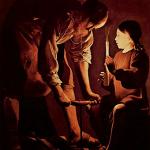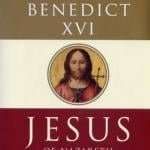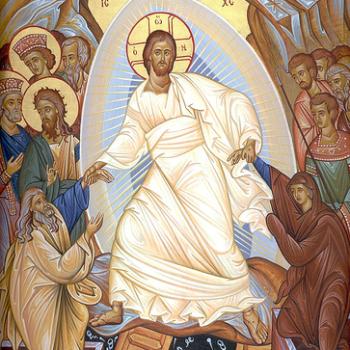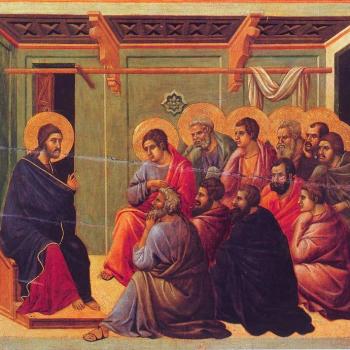Lent is full of high holy feast days.
St. Patrick is honored among the Irish.
The patron of the universal church, St. Joseph, is honored by the whole church and especially Italians.
And during this month of penance and sacrifice his wife Mary is remembered for her fiat to God.
It is now 9 months of shopping days before Christmas.
Here is Venerable Archbishop Fulton J. Sheen sharing with us some thoughts on that event.
The Worlds First Love (1952)
Public Domain![]()
![]()
by Archbishop Fulton J. Sheen,
Edited by Darrell Wright (2009) from a text file at archive.org
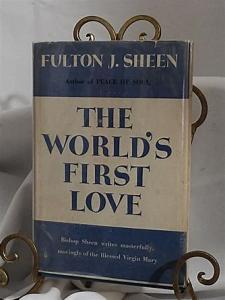
The first man, Adam, was made from the slime of the earth.
The first woman was made from a man in an ecstasy. The
new Adam, Christ, comes from the new Eve, Mary, in an
ecstasy of prayer and love of God and the fullness of freedom.
When Freedom and Love Were One: The Annunciation
When the sixth month came, God sent the angel Gabriel to a city of Galilee called Nazareth, where a virgin dwelt betrothed to a man of David’s lineage;
His name was Joseph, and the virgin’s name was Mary. Into her presence the angel came, and said,
“Hail, thou who art full of grace; the Lord is with thee; Blessed art thou among women.”
She was much perplexed at hearing him speak so, And cast about in her mind, what she was to make of such a greeting.Then the angel said to her,
“Mary, do not be afraid; Thou hast found favour in the sight of God. And behold, thou shalt conceive in thy womb, and shalt bear a son and shalt call him Jesus.
“He shall be great, and men will know him for the Son of the most High; The Lord will give him the throne of his father, David, And He shall reign over the house of Jacob eternally; His Kingdom shall never have an end.”
But Mary said to the angel, “How can that be, since I have no knowledge of man?”
And the angel answered her, “The Holy Spirit will come upon thee and the Power of the most High will overshadow thee. Thus the holy thing which is to be born of thee shall be known for the Son of God.”
-The Gospel of St. Luke (1:26-35)
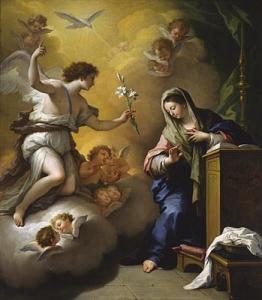
But from our point of view there seems to be another difficulty. Mary was chosen by God to be His Mother, and was even prepared for that honor by being preserved free from the primal sin that had infected all humanity. If she were so prepared, would she be free to accept or to reject, and would her answer be the full fruit of her free will? The answer is that her redemption was already completed, but that she had not yet accepted nor ratified it. It was, in a way, something like our dilemma. We are baptized as infants and our bodies become temples of God, as our souls have been filled with infused virtues. We become not just creatures made by God, but partakers in Divine nature. All this is done in Baptism before our freedom blossoms, the Church standing responsible for our spiritual birth, as our parents did for our physical birth.
Later on, however, we ratify that original endowment by the free acts of our moral lives by receiving the sacraments, by prayers, and by sacrifices. So, too, Mary’s redemption was completed as our Baptism was completed but she had not yet accepted, ratified, or confirmed it before she gave her consent to the angel. She was
planned for a role in the drama of redemption by God, as a child is planned for a musical career by his physical parents, but it was not fulfilled until this moment. The Holy Trinity never possesses a creature without the consent of His will. When, therefore, Mary had heard how this was to take place, she uttered words which are the greatest pledge of liberty and the greatest charter of freedom the world has
ever heard:
“Be it done unto me according to thy word.”
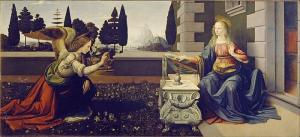
As in Eden there took place the first espousals of man and woman, so, in her, there took place the first espousals of God and man, eternity and time, omnipotence and bonds. In answer to the question: “Will you give me a man?” the marriage ceremony of love becomes bathed with new depths of freedom: “I will” – And the Word was conceived in her.
Here, then, is freedom of religion; God respects human freedom by refusing to invade humanity and to establish a beachhead in time without the free consent of one of His
creatures. Freedom of Conscience is also involved: before Mary could claim as her own the great gifts of God, she had to ratify those gifts by an act of will in the Annunciation. And there is the freedom of a total abandonment to God: our free will is the only thing that is really our own. Our health, our wealth, our power – all these God can take from us. But our freedom he leaves to us, even in hell. Because freedom is our own, it is the only perfect gift that we can make to God. And yet here a creature totally, yet freely, surrendered her will, so that one might say that it was not a matter of Mary’s will doing the will of her Son, but of Mary’s will being lost in that of her Son. Later on in His life he would say:
“If the Son of Man makes you free, you will be free indeed.”
If this be so, then no one has ever been more free than this belle of Liberty, the lady who sang the Magnificat. As the “no” of Eve proves that the creature was made by love and is therefore free, so thy Fiat proves that the Creature was made for love, as well. Teach us, then, that there is no freedom except in doing, out of love, what thou didst do in the Annunciation, namely, saying Yes to what Jesus asks.


